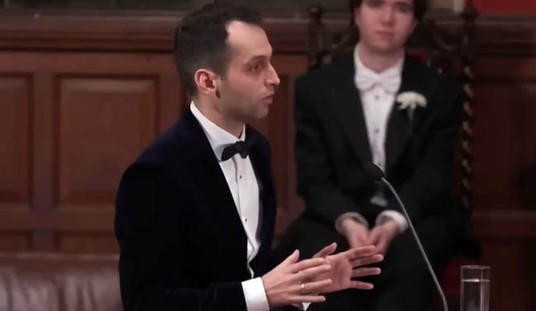Benjamin Netanyahu’s speech got high marks from Republicans yesterday, and a measure of response as well. Senator Rand Paul introduced the “Stand With Israel Act of 2015” yesterday, which focuses on the Israeli-Palestinian conflict rather than Iran, but the timing certainly took advantage of the high interest in Netanyahu’s speech. While Democrats like Nancy Pelosi and Chris Matthews melted down, though, others wondered why Barack Obama didn’t have a good response to Netanyahu’s arguments.
That includes the editorial board of the Washington Post. Just a few hours after Netanyahu left the dais, they wondered why Obama didn’t provide “real answers” to the concerns raised in the speech, rather than just offer “political attacks” on the head of government of an ally:
Mr. Netanyahu’s arguments deserve a serious response from the Obama administration — one it has yet to provide. The White House has sought to dismiss the Israeli leader as a politician seeking reelection; has said that he was wrong in his support for the Iraq war and in his opposition to an interim agreement with Iran; and has claimed that he offers no alternative to President Obama’s policy. Such rhetoric will not satisfy those in and out of Congress who share Mr. Netanyahu’s legitimate questions.
His speech singled out “two major concessions” he said would be part of any deal the United States and its partners conclude with Iran. The first is the acceptance of a large Iranian nuclear infrastructure, including thousands of centrifuges for uranium enrichment. The second is a time limit on any restrictions, so that in as little as a decade Iran would be free to expand its production of nuclear materials. Consequently, Mr. Netanyahu said, the deal “doesn’t block Iran’s path to the bomb; it paves Iran’s path to the bomb.” …
Mr. Netanyahu strongly disputed that point. “Iran’s nuclear program can be rolled back well beyond the current proposal by insisting on a better deal and keeping up the pressure on a very vulnerable regime,” he said. Is that wrong? For that matter, is it acceptable to free Iran from sanctions within a decade and allow it unlimited nuclear capacity? Rather than continuing its political attacks on Mr. Netanyahu, the administration ought to explain why the deal it is contemplating is justified — or reconsider it.
The skepticism over the White House response extends to former Obama adviser and Middle East envoy Dennis Ross, who called the speech “a strong case” against the deal Obama has cooking with Tehran in an op-ed for USA Today. Ross also rebuts the notion that Netanyahu didn’t offer an alternative:
Accepting the mantra that “no deal is better than a bad deal,” Netanyahu offers the alternative of insisting on better terms and increasing the pressure on the Iranians until a more credible agreement is reached. He does not fear the Iranians walking away from the negotiating table because, in his words, they need the deal more than the U.S. and its partners.
While the Obama administration is unlikely to accept his argument that it should simply negotiate better and harder, it should not dismiss the concerns he raises about the emerging deal. Indeed, the administration argument that there is no better alternative than the deal it is negotiating begs the question of whether the prospective agreement is acceptable.
And, here, the administration needs to explain why the deal it is trying to conclude actually will prevent Iran from getting nuclear weapons for the life-time of the agreement and afterwards. It needs to explain why the combination of the number and quality of centrifuges, their output, and the ship-out from Iran of enriched uranium will, in fact, ensure that the break-out time for the Iranians will not be less than one year. Either this combination adds up or it does not, but there should be an explicit answer to Netanyahu’s charge that Iran will be able to break-out much more quickly.
Obama owes Netanyahu — and the rest of us — an explanation of his determination to enforce an agreement, Ross argues:
We cannot wait to determine what we will do about violations when they happen. Iran must know in advance what the consequences are for violations, particularly if we want to deter them in the first place. And, this clearly goes to the heart of Netanyahu’s concerns: if he had high confidence that we would impose harsh consequences in response to Iranian violations, including the use of force if we caught Iran dashing toward a weapon, he would be less fearful of the agreement he believes is going to emerge.
But he does not see that, and he fears as with past arms control agreements, we will seek to discuss violations and not respond to them until it is too late. So the administration should address this fear and prove it means what it says by spelling out different categories of violations and the consequences for each — and then seek congressional authorization to empower this president and his successors to act on these consequences.
Ross isn’t the only voice arguing for Congressional involvement. Former Senators Saxby Chambliss (R-GA), Evan Bayh (D-IN), and Norm Coleman (R-MN) have formed a bipartisan effort to warn Americans of the dangers of a nuclear Iran. In a new 30-second television spot, backed by a $500,000 initial ad buy, the American Security Initiative makes the point that a nuclear Iran doesn’t need an ICBM to strike the US:
Three former senators have launched a new 501(c)(4) — the American Security Initiative — to pressure policymakers to address the “potential threat posed to America by Iranian nuclear proliferation” — and their first public foray is a chilling one. The group, headed by former Sens. Saxby Chambliss (R-Ga.), Evan Bayh (D-Ind.) and Norm Coleman (R-Minn) is going up today with a $500,000 ad buy insinuating America could be the target of a nuclear attack.
They’re taking aim at a few particular members of Congress, too — including the one who introduced the Stand With Israel Act:
In the 30-second spot, airing in Washington, Lexington, Ky. and Springfield, Ill., the camera takes the point of view of a terrorist driving a van that conceals a bomb. The van pulls into a parking lot in a crowded urban area before detonating. “Tell Washington: No Iran nuclear deal without Congressional approval,” a narrator says, as the phone numbers for the White House and the Senate appear on the screen. The spot is aimed at members of Congress, but the Lexington and Springfield flights specifically target GOP Sen. Rand Paul and Democratic Sen. Dick Durbin. The effort also includes a digital ad campaign.
The Obama administration response yesterday essentially argued trust us, we know what we’re doing. That’s not good enough for the Washington Post or Dennis Ross, and after seeing the debacle of Obama’s foreign policies in Libya, Iraq, Syria, Egypt, and Ukraine, it’s not difficult to understand why.









Join the conversation as a VIP Member